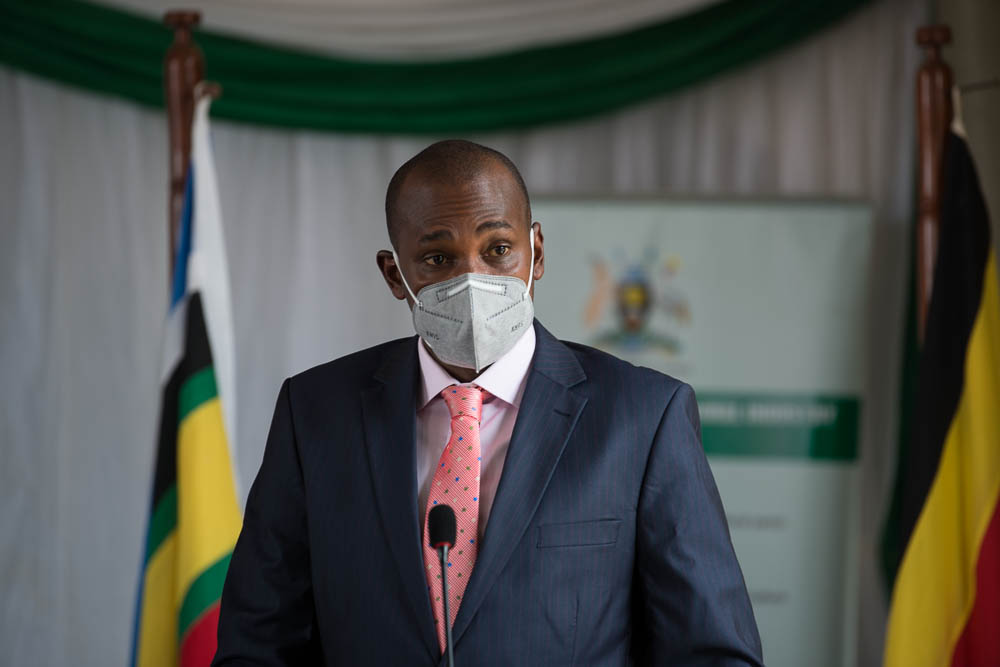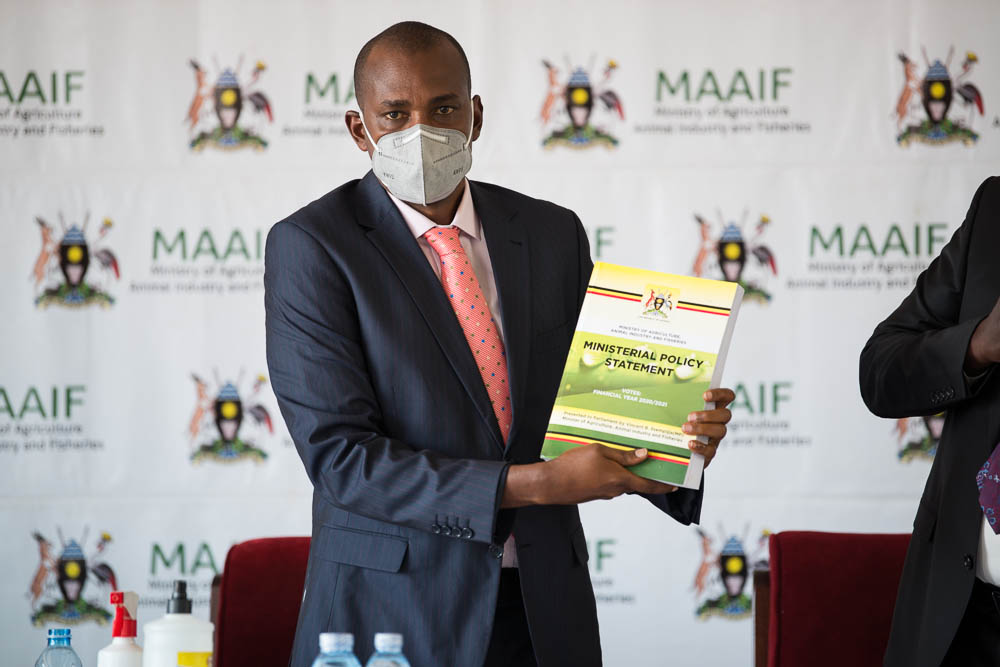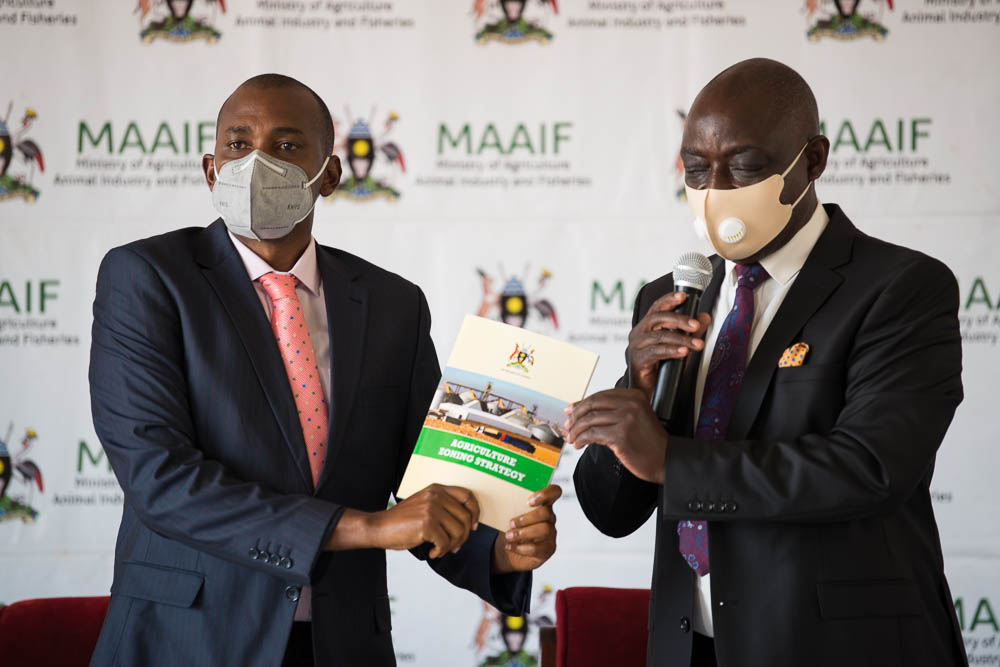
Hon. Tumwebaze promises a hands-on approach in the Agriculture Sector

Hon. Frank Tumwebaze, the new Minister of Agriculture, Animal Industry and Fisheries (MAAIF), has promised to apply a proactive approach through directly engaging farmers on ministry policies. He said this on June 22 after taking office at the ministry headquarters in Entebbe.
“In this term, we will spend more time with the farmers in the fields than in conferences,” he said.
The handover ceremony, whose attendance was limited due to the Covid-19 protocols, was presided over by Mr. Pius Wakabi Kasajja, the ministry Permanent Secretary, in the presence of other senior ministry officials. Hon. Tumwebaze officially received the ministry instruments of power and authority that include the ministerial policy statement, the agricultural zoning policy and the agricultural business enterprise handbook, among other statutory documents.

In his remarks, Hon. Vincent Bamulangaki Ssempiija, the outgoing minister, informed Hon. Tumwebaze that the agricultural sector recorded significant growth over the last five years despite the recent challenges such as the invasion of desert locusts in January, 2020, which were followed by the Covid-19 pandemic that slowed down the whole economy that resulted into wasted produce of bananas, eggs, milk and most recently market entry issues for our maize products.
The Permanent Secretary, briefed the incoming Minister that the Agro-Industrialization Program, in which the Ministry of Agriculture plays a lead role, has the following key objectives; Increasing agricultural production and productivity of priority commodities to promote agro-industry; Improving post-harvest handling and storage of priority commodities, agro-processing and value addition of priority commodities; Increasing market access and competitiveness of agricultural products in domestic and international markets; Increasing the mobilisation, equitable access and utilization of agricultural finance and strengthening institutional coordination for improved service delivery.
“In order to commercialize agriculture, MAAIF under NDPIII, will focus on two main issues of making the agribusinesses more profitable and attractive for investment. These are; de-risking Agriculture enterprises at all levels and supporting the creation of adequate markets for various priority enterprises,” Mr. Kasajja said
Hon. Frank Tumwebaze, the new Minister of Agriculture, Animal Industry and Fisheries in his inaugural remarks applauded the previous leadership and the technical teams for the food security witnessed across the country of over 80% and encouraged them to work with the primary stakeholders, the farmers. The Hon. Minister outlined the following priority areas in response to a public outcry and these included; animal and crop disease management, mechanization, efficient public private sector partnerships, evidence-based decision making, quality seed and indigenous seed conservation, government farm land use strategies and extensive farmer engagement.

“Having previously been the President of the Uganda National Farmers Federation, I am only coming back home. I am a straightforward person. And where I may not know I am a very fast learner and believe that together, we will align our sector to farmer needs and concerns and ultimately attain our socio-economic growth,” said Hon. Tumwebaze
Hon. Tumwebaze concluded by pledging his commitment to deliver a cohesive leadership and a well-coordinated sector through listening, learning and providing able leadership as government goes into the implementation of the parish development model.

Dear Hon. Minister
Thank you for this invaluable communication.
My heart is aching and racing so fast. Vanilla farmers in Kasese are in panic. Their investment in Vanilla growing is under threat by nosediving prices. As of now, uncured vanilla trades at 20,000sh a kg. What is their fate? How can your ministry save this situation?
Kindly come to their rescue. We need sustainable solutions, else poverty will escalate in the area.
Thank you, once again.
thanks
EYE OPENER
This pandemic has opened our eyes that Agriculture should be given the biggest percentage of the National Budget to solve the issue of lack of food and income and it has challenged the lack of Government farms and ranches let the ministry revive this
I’m matovu vianney Ngoma
Chief Whip/National political commissar FRONASA
Thanks for the best information of our nation’s wealth/development,
omuganda agamba “atakora tarya” obulamu bwomuntu okubeela neemele kyeekisooka, ate M.A.A.IF Headquoters baagalanyo okutuka kuburimuntu wegwaanga ayagala enkurakurana, ugandans tukwaatire wamu tweeziimbe.
Dear Hon Minister,
Having a hands on approach is the best we can wish for, and this will enable you get a glimpse of the real challenges on ground. We request, that this approach is extended to suppliers plight too especially under ACDP who accessed credit from banks to supply post harvest handling materials to Farmers but have not received payment since June 2021 and risk loosing mortgaged properties. We appreciate the need to streamline the processes, but request that those whose work has been verified get paid.
Your positive response to handle this matter will be highly appreciated.
Using the proactive approach is very good, but the agriculture Extension systems in the country should be revised. For example many organisations and company’s have employed persons who are not technical at all and this means the information they are dessimenting could be wrong
Case 1
A Field extension officer from 1 NGO during a training I had attended told us that establishing nursery beds for maize is now the new technology that should be adopted,!!!!
Recommendation
1.Licences should be also introduced in the agriculture Extension system and renewed periodically depending on ones persons.
2. Agriculture is a science and do the ground and foot soildiers in the field should at least have an agriculture background, this will increase effectiveness and efficienciey of the proactive approach
Conclusion
It is funny and dangerous to see a primary teacher conducting a brain operation onto a cancerous patient.